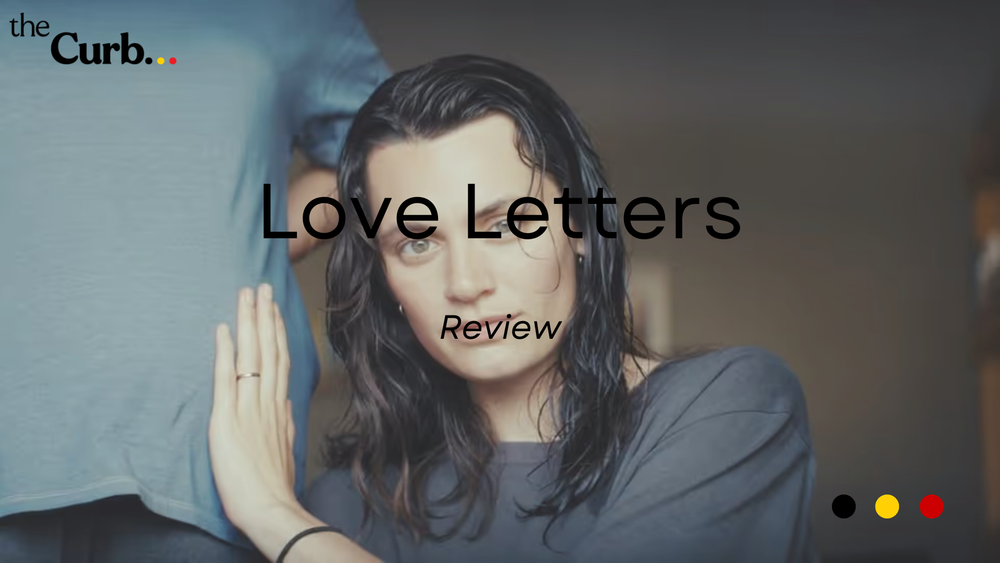Alice Douard’s Love Letters (Des Preuves d’Amour) is the kind of film that sneaks up on you. On paper, it might look like another story about motherhood—a theme cinema has returned to countless times—but what Douard manages to do is carve out a space that feels fresh, specific, and deeply moving. It’s her first feature, and already she shows a sharp eye for how to turn the intimate into the political, and vice versa.
The film opens in Paris in 2014, right after the legalization of same-sex marriage in France. This isn’t just a background detail—it’s the foundation of everything that follows. Without that monumental shift in law, Céline (Ella Rumpf) and her wife Nadia (Monia Chokri) wouldn’t be able to dream of building their family in the way they do. Nadia is pregnant with their daughter, and while that may sound like a simple progression of life, it isn’t for Céline. Because she isn’t the biological mother, she has to go through a grueling adoption process just to be legally recognized as her child’s parent.
What’s striking is how Douard chooses to frame this ordeal. Instead of leaning into the heavy-handed drama of bureaucracy, she allows humor to slip in. There’s something almost absurd about the hoops Céline must jump through—collecting testimonies from friends and family, convincing institutions that she is, in fact, capable of loving and raising her child. At one point, a friend’s attempt to describe her maternal qualities spirals into a hilariously awkward defense that’s both funny and heartbreaking. The laughter never comes at Céline’s expense; rather, it highlights the ridiculousness of a system that forces a woman to prove her worthiness as a mother while she’s already living it.
The comedy is warm, not biting, and that’s important. Love Letters is a film that refuses to let bureaucracy crush its characters. Instead, Douard injects hope, kindness, and a quiet resilience into the story. It’s political, yes, but never in a way that overshadows the human heart of the film.
At its core, this is a movie about motherhood in all its messiness and multiplicity. Céline’s desperate need to be recognized as a mother mirrors Nadia’s vulnerability as she steps into pregnancy, a role that is as terrifying as it is beautiful. Layered on top of this is Céline’s complicated relationship with her own mother, a celebrated pianist who often chose career over parenting. This mother-daughter tension provides one of the film’s richest contrasts: Céline, a DJ creating music for clubs, and her mother, immersed in Beethoven’s classical rigor. The soundtrack becomes a kind of dialogue between them, filling in the silences where words can’t reach. Music, in this world, is both inheritance and confrontation.
Douard doesn’t shy away from imperfection. Motherhood here isn’t a glossy ideal but a spectrum of experiences—longing, fear, resentment, tenderness. The film captures that universal truth: to be a mother is always to be measured, doubted, questioned, whether by others or by oneself.
Ella Rumpf and Monia Chokri bring incredible depth to their roles. Together, they make Céline and Nadia feel like a real couple, not just characters written to embody an issue. Their chemistry is quiet but undeniable, full of little gestures, moments of doubt, and shared laughter. They aren’t performing grand speeches about love or equality; they’re living it in the everyday, in the small ways couples show up for each other. That authenticity grounds the film, making it resonate far beyond its specific legal and political context.
What I love most about Love Letters is its insistence on joy. Too often, LGBTQ+ stories onscreen are framed entirely through the lens of struggle, as though queer lives are defined only by the obstacles they face. Douard doesn’t deny the difficulty—IVF abroad, the cost of legal battles, the sting of prejudice—but she also makes room for humor, hope, and love. There’s beauty in the way Céline and Nadia build their family, even when the system seems determined to make it harder for them.
The film isn’t perfect. It hints at economic struggles—the expense of IVF and adoption—but doesn’t fully explore that thread, and at times it feels like too many themes are fighting for space within its runtime. Still, the heart of the movie is strong enough to carry it.
In the end, Love Letters is less about proving motherhood and more about redefining it. It’s about the courage it takes to claim your place as a mother, a partner, a daughter, even when society demands you explain yourself at every turn. Douard has crafted a story that feels both deeply personal and quietly radical, and it’s a reminder that love, in all its forms, is worth fighting for.
Director: Alice Douard
Cast: Ella Rumpf, Monia Chokri, Noémie Lvovsky
Writers: Alice Douard, (Julie Debiton & Laurette Polmanss, screenplay consultants)
Producer: Marine Arrighi de Casanova
Cinematographers: Jacques Girault, Evgeny Rodin
Editor: Pierre Deschamps

